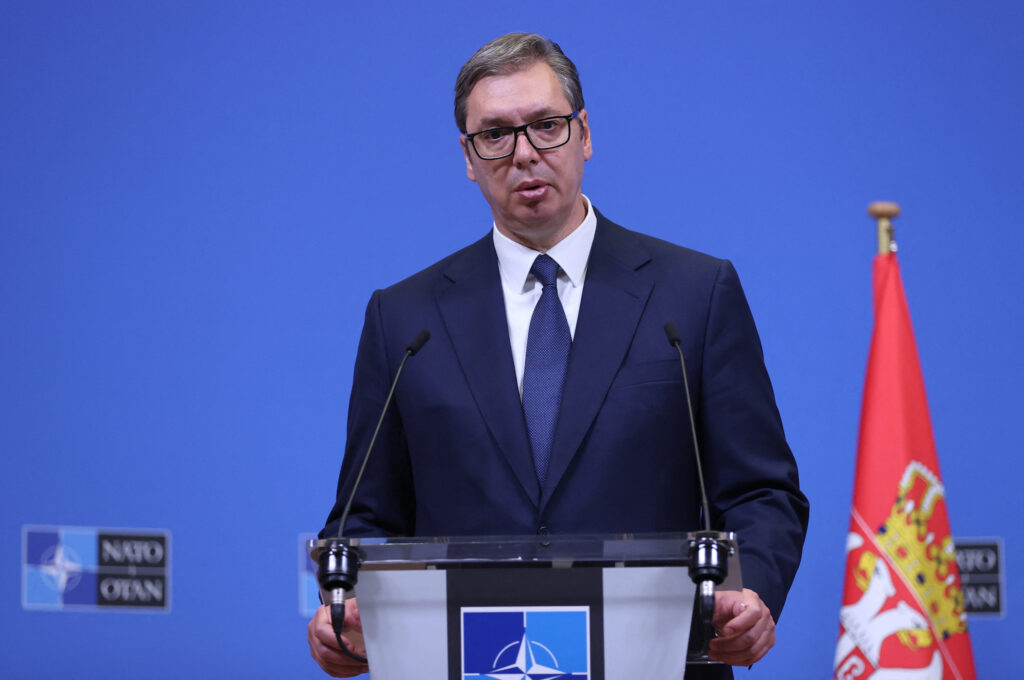While it appears Serbia has begun to de-escalate tensions in the Balkans, the past few weeks have been some of the most intense in the region for over a decade.
Serbia moved heavy military equipment to its southern border with Kosovo, and President Aleksandar Vucic visited his forward-deployed troops on that same border.
To be clear, Vucic often leverages Kosovo for expedient political gain but has never escalated tensions to this level. His actions have sent hundreds (if not more) experts scurrying, hoping to answer the question: what can be done to de-escalate the situation and preempt another Balkan bloodletting?
Unfortunately, most answers are crafted through a concern/defensive prism. Should those experts consider examining the situation through an opportunistic prism, they might find President Vucic has given the West a wonderful gift that should not be passed up.


Dealing With Serbia
The first thing most learn about Serbia and Vucic is that they are far more likely to de-escalate when confronted with power, and he almost always feasts on weakness.
As the situation escalated, NATO and the West were feverishly debating an increase to NATO’s Kosovo Force, rapidly improving their heavy weapons, expediting the Kosovo Security Force’s graduation towards a true army, or lobbying other nations to recognize Kosovo.
Arguably, Belgrade (and by proxy, Moscow) already expected these moves and watched Brussels with enjoyment as they ate popcorn.
While contentious, the following is a different approach to dealing with Serbia. If NATO seeks options that will get Vucic’s attention, they may wish to undertake a massive diplomatic effort in Brussels, gain consensus, and announce the following to Belgrade:
1. ABL No More
NATO nations will no longer use the term “ABL” (Administrative Boundary Line). Henceforth, the ABL will be referred to as a “border.”
Since the 1999 UN Resolution, the division between Serbia and Kosovo has been referred to as an ABL, partly to secure Belgrade’s agreement regarding the war’s end. On all NATO correspondence, as well as any engaging with Serbia, the term is mandatory language.
ABL was crafted over two decades ago as a bargaining chip to secure peace. The term served its purpose but is no longer relevant.
2. ‘So Called’ No More
NATO nations will no longer respond to or address journalists, governments, or entities which refer to Kosovo as a “so-called region.”
Much like ABL, this is how Serbia, Russia, and others have qualified Kosovo not only in diplomatic engagement but in press or public statements.
It’s lasted for two decades since the 1999 Kosovo War. The phrase is a sophomoric diplomatic stunt that has long worn out its welcome.
3. Institutions in Kosovo No More
NATO nations will no longer use the term “Institutions in Kosovo” (IiK) when referring to Kosovo’s governmental structures.
IiK has been a long-standing self-imposed term used within NATO to appease Serbia. It has run its course.
4. The Counter-Threat
Lastly, NATO clearly conveys that if Serbia wishes to saber rattle as an island in a NATO sea, so be it.
However, the West will no longer placate its petulant, childish behavior. Further Serbian escalation will only lead to expediting Kosovo’s NATO membership along with Finland and Sweden.
Gaining Consensus
Understandably, to professional diplomats familiar with Serbia-Kosovo tensions, gaining consensus on these four statements is “impossible.”
Within NATO, four countries — Greece, Slovakia, Spain, and Romania — have yet to recognize Kosovo. The reason is domestic issues and in no way based on any fear of or affinity towards Serbia and its allies.
A substantial amount of diplomatic convincing will be required to garner non-recognizing nations’ support and a willingness to expend some political capital from their elected officials.
Fortuitously, Vucic’s most recent actions may have afforded new arguments to help convince those nations.
Opportunity
Vucic’s recent high-water-mark of conflict escalation has generated some sobering discussions within the halls of NATO’s headquarters and in capitals. While no NATO member (including the four non-recognizers) desires additional conflict in Eurasia, especially juxtaposed with the war in Ukraine, this is exactly what Vucic threatened.
This fact should serve as the debate foundation in attempts to move the four non-recognizing nations. In conjunction with numerous other diplomatic carrots and sticks, there is a possibility these four could join consensus on these statements, a step far easier than nationally announcing a full recognition of Kosovo.
While the likelihood of victory is perhaps slim, Vucic’s recent overburdening thuggery has presented an opportunity. Diplomatic discourse that strongly responds to Serbia while advancing Kosovo is worthy of effort, especially with existing regional security challenges in Ukraine.
Even if the diplomatic effort falls short, a message will be sent to Belgrade; one that even Vucic can understand.
For a majority of NATO nations, sanctions and strong diplomatic statements will no longer be the go-to actions when responding to Serbia’s escalatory rhetoric.
Efforts to further Kosovo’s legitimacy will be the response, and it’s something that will sting Vucic personally, professionally, and politically.
Additionally, Jeff served as a Defense Official at US Embassies in Austria and Kosovo.
Jeff resides in Austria with a master’s degree from the National Defense University. He is an award-winning author of LIVE RANGE and BALKAN REPRISAL, both available globally on Amazon.
The views expressed in this publication are those of the author and do not necessarily reflect the official policy or position of the Department of Defense or the US government.
The public release clearance of this publication by the Department of Defense does not imply Department of Defense endorsement or factual accuracy of the material.
The views and opinions expressed here are those of the author and do not necessarily reflect the editorial position of The Defense Post.
The Defense Post aims to publish a wide range of high-quality opinion and analysis from a diverse array of people – do you want to send us yours? Click here to submit an op-ed.


